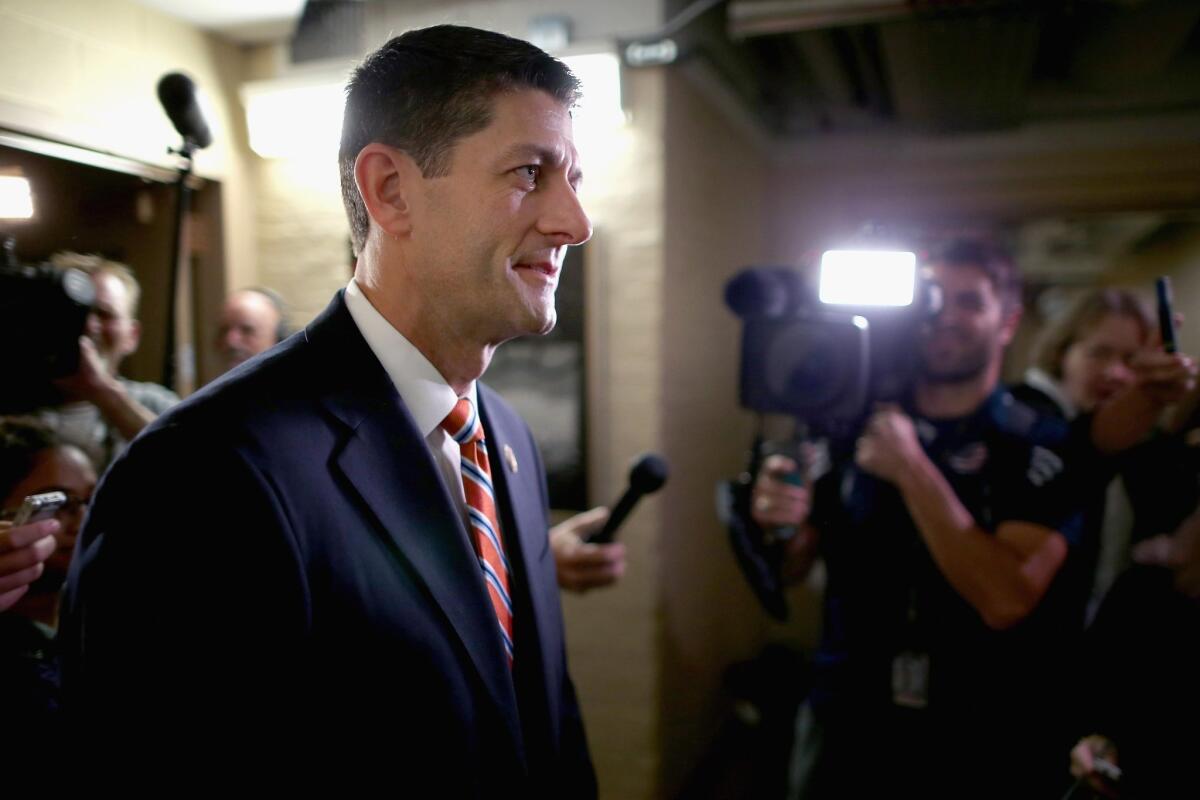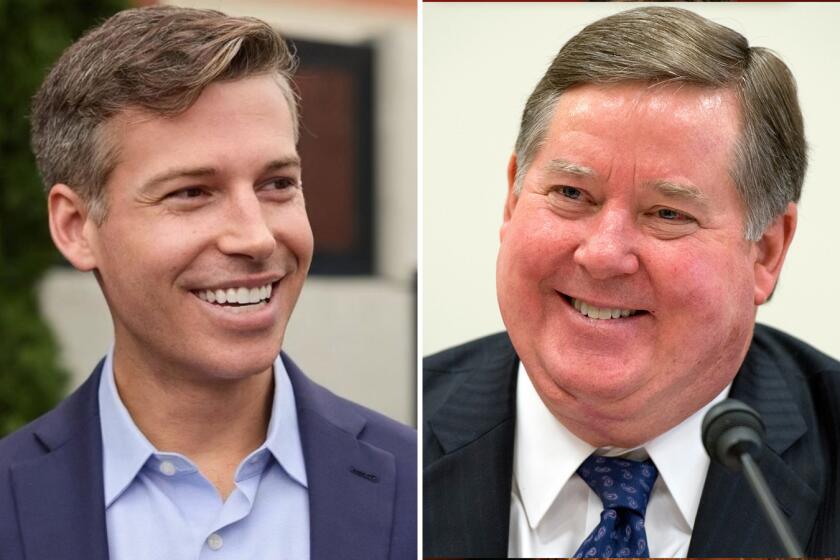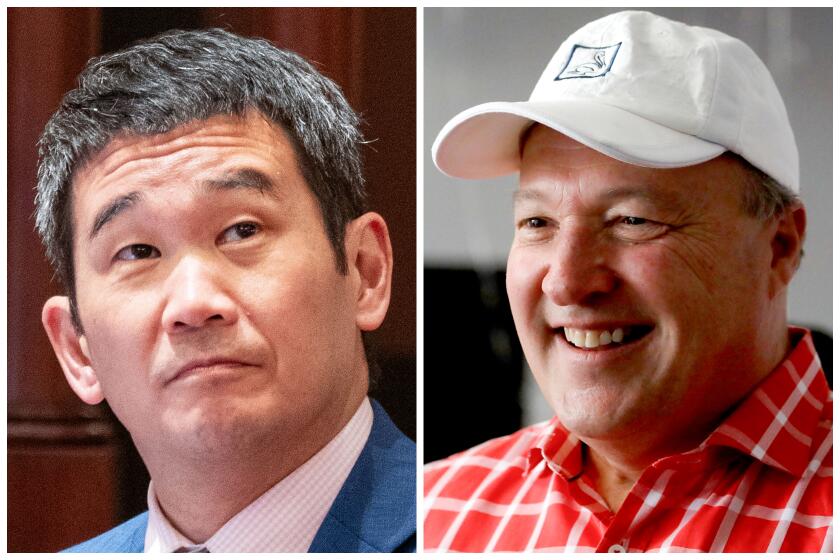Taking the House speaker job could be a political loser for Rep. Paul D. Ryan

House Ways and Means Committee Chairman Paul Ryan (R-Wis.) heads for House Republican caucus meeting in the basement of the Capitol in Washington on Oct. 9, 2015.
Reporting from Washington — After repeatedly insisting that he had no interest in becoming speaker of the House, Republican Rep. Paul D. Ryan was seriously considering the job Friday.
He had little choice. The wonkish Wisconsin congressman and former vice presidential nominee is seen as the GOP’s best hope to calm the chaos in the GOP-controlled House after Majority Leader Kevin McCarthy (R-Bakersfield) abruptly pulled out of the race to replace retiring Speaker John A. Boehner (R-Ohio) amid a conservative backlash.
As House Republicans met privately Friday in the Capitol basement to assess the fallout, the hard sell to recruit Ryan spilled into open pleadings that he run. Some even suggested he should simply be made speaker without a vote — by acclamation.
“Paul’s looking at it, but it’s his decision,” McCarthy said after the session. “If he decides to do it, he’d be an amazing speaker.” But McCarthy, who was considered next in line for the post, also offered a caution: “It’s a big job.”
TRAIL GUIDE: All the latest news on the 2016 presidential campaign >>
It’s not hard to understand Ryan’s hesitation. Taking over the gavel could be a political loser for Ryan, who would inherit the same dysfunction fueled by a rebellious conservative minority that forced Boehner to announce his early retirement just two weeks ago and then doomed McCarthy’s bid to replace him.
Behind the usual protestations against spending time away from his family and three small children, Ryan’s reluctance is rooted in a more realistic calculation of the political damage the speaker’s job could do to his promising career.
Now in his ninth term in office, Ryan is often mentioned as presidential material, even though he passed on the 2016 campaign to remain at his perch as chairman of the Ways and Means Committee. He is thought of as one of the GOP’s brightest thinkers and the economic guru who crafted the “Ryan Budget” that would turn Medicare into a voucher system to deeply cut costs.
At the same time, Ryan has enjoyed unusual popularity among Republicans without the messy challenges of leadership or the time-consuming job of fundraising. Among other duties, the modern speaker must spend much of his or her time traveling the country to raise money for the party’s candidates.
But Ryan’s conservative credentials have not been fully tested in the day-to-day wrangling required of a leader, and a bruising turn as speaker risks dimming his star-power. Outside conservative groups have already begun to attack.
“I know Paul’s getting a lot of pressure today,” said Rep. Dave Reichert (R-Wash.). “I don’t care who the speaker is, he’s going to have the same battles.”
Ryan did not address the closed-door session Friday, but Rep. Michael McCaul (R-Texas), a committee chairman, said he thought Ryan would agree to run.
“We’re going to need a leader who can bring all these factions together instead of being at war with each other, and that’s very difficult to do,” McCaul said. “I think he’s leaning toward it. I know the speaker’s been putting a lot of pressure on him. I know various members of the conference and chairman — they want him to get in.”
Ryan’s former 2012 running mate, former Massachusetts Gov. Mitt Romney, has also called to encourage the congressman to take the post.
Ryan once aligned himself with a new generation of Republicans. “Young Guns” was a political manifesto he wrote with McCarthy and former Majority Leader Eric Cantor just five years ago.
But the Young Gun era has already been pushed aside by an even fresher group of hard line conservatives that has thrown the party into disarray. Virginia’s Cantor was the first to fall, toppled in a surprise 2014 primary loss to a tea party newcomer, Rep. David Brat, who is now part of the influential House Freedom Caucus. With an estimated 40 members, the caucus is hoping to play a key role in selecting the next speaker, and many members do not see Ryan in same gauzy light as their colleagues.
“Everyone’s waiting to see what Paul does,” said Rep. Mark Meadows (R-N.C.), who led the fight against Boehner. Some predicted Ryan would not necessarily glide into the job and could face resistance if he declined to endorse the kinds of procedural changes backed by the caucus.
But demands or dissent from the conservatives will almost certainly push Ryan away from a run. In fact, the congressman is not expected to campaign for the job at all.
On Friday, he began his day like most others -- waking up in the office where he sleeps while in Washington, then hitting the gym for a workout before settling in for eggs and sausage at the closed door meeting.
For the budget wonk who finally has the chairmanship he set his sights on almost since arriving in Congress 17 years ago, he is hesitant to give up the job he always wanted for one he doesn’t.
Some supporters predict he would only take the speaker’s gavel if he had the full support of the House GOP, and such unity is a tall order.
As lawmakers adjourned for a week’s recess, at least a dozen other Republicans have emerged as possible candidates, but none have broad appeal among the severely divided majority. Those being considered, or hoping to be, reflect the vast differences within the House GOP majority.
Rep. Jason Chaffetz of Utah, who made a last-minute play to run as an alternative to McCarthy, said Friday he would not run against Ryan. Rep. Daniel Webster of Florida, a member of the Freedom Caucus, is also running.
California Rep. Darrell Issa (R-Vista), the hard-charging former chairman of the House Oversight Committee, tossed his name forward, but then immediately said he would instead back Ryan.
Rep. Trey Gowdy (R-S.C.), who rebuffed Boehner’s earlier calls to run for majority leader, could still emerge, as could a hard-right conservative candidate.
In the meantime, Boehner’s scheduled Oct. 30 departure could be delayed. He has vowed to stay on until a new leader is chosen, which he predicted would take place by the end of the month.
“Time for us to take the walls down, open up our ears and listen to each other,” Boehner told lawmakers Friday, according to a person in the room. “But while we go through this process, we’ve got to continue to address the people’s priorities. This institution cannot grind to a halt.”
For the latest from Congress and 2016 campaign follow @LisaMascaro
For more, go to www.latimes.com/politics
ALSO
L.A. poised to approved nation’s strongest earthquake safety rules
The night the hospital in Kunduz became a U.S. military target
More to Read
Get the L.A. Times Politics newsletter
Deeply reported insights into legislation, politics and policy from Sacramento, Washington and beyond. In your inbox three times per week.
You may occasionally receive promotional content from the Los Angeles Times.











